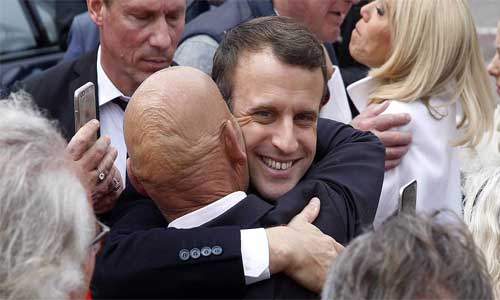Though the final vote tally might seem to suggest otherwise, the European Parliament elections were a strategic success for French President Emmanuel Macron. There are four reasons why this is so.
First, Macron succeeded in framing the election as a contest between progressives and populists. Though he has been assailed at home in recent months – including by some on his own “side” – it is worth remembering that this message did not emerge out of thin air. Rather, it harks back to Macron’s 2017 presidential campaign, which itself tapped into a broader political sea change taking place across Europe. In that election, he overcame the traditional right-left divide. Two years later, this was replicated in the European Parliament elections.
Historically, the Republicans on the right and the Socialists on the left have dominated French politics. Yet these parties’ combined share of the popular vote was under 15%, whereas Macron’s La République en Marche ! won 22.4%, and the far-right National Rally (formerly the National Front) picked up 23.3%. Behind these figures is an unprecedented collapse of the mainstream French right, which has failed to reconcile identity politics with traditional liberalism. Though some French conservatives have migrated to the National Rally, much of the center-right electorate has gravitated toward Macron’s party, owing to efforts by Prime Minister Édouard Philippe (formerly of the Republicans).
Moreover, most of those who switched to La République en Marche ! are pensioners who did so despite being hit hard by Macron’s tax reforms (some of which have been reversed). This suggests that Macron’s progressive-versus-populist narrative helped to re-mobilize France’s – and perhaps Europe’s – pro-European electorate. While the National Rally performed well and Italy’s right-wing League party made gains, they failed to trigger the EU-wide political earthquake that many had come to expect.
The second reason the election represents a victory for Macron is that his party will now be able to claim leadership over a pivotal centrist parliamentary group of 110 members. The relative losses suffered by the European People’s Party (EPP) and the Progressive Alliance of Socialists and Democrats (S&D), combined with the surge in support for the Greens, means that the European Parliament is entering a period of quadripartite governance. Provided these groups are able to compromise, the new arrangement will probably be an improvement on the old one, wherein the EPP and S&D divvied up all of the jobs. For the first time in the European Parliament’s history, the number of MEPs affiliated with the two main parties represents only 44% of the total.
A more fluid parliamentary composition will allow for more ad hoc majorities to emerge in support of various policy proposals, given that there is so much common ground between La République en Marche !, the S&D, and the Greens. And, as an added bonus, the end of the EPP/S&D duopoly also marks the end of German hegemony in the Parliament.
Third, the Spitzenkandidaten process – whereby the largest party grouping selects the president of the European Commission – is likely to collapse, and this may also work to Macron’s advantage. The system is a first-past-the-post mechanism in a proportionally elected Parliament, and has more to do with partisanship than with democracy, because it gives automatic power to the largest group.
But while the EPP won the most parliamentary seats, its Spitzenkandidat, Manfred Weber, is very controversial. Just before the election, he was weakened by the political demise of Austrian Chancellor Sebastian Kurz, whose government was brought down by the release of a video in which his vice chancellor, Heinz-Christian Strache of the Freedom Party, appears to offer a quid pro quo for electoral help from Russia.
But Merkel still defends Weber, and, apart from Macron and Dutch Prime Minister Mark Rutte, most EU leaders are reluctant to confront the European Parliament on the Spitzenkandidaten issue. That may shorten the odds for Margrethe Vestager – who is not from the EPP, but who is, in a sense, a liberal Spitzenkandidat – while while lengthening them for Michel Barnier, who is from the EPP but is not a Spitzenkandidat. If the Council succeeds in ruling out Weber and his populist supporters, Macron will claim it as a success.
Finally, the election provides a check on German hegemony within the EU more broadly. Germany’s Christian Democratic Union (CDU) has been weakened, and the country’s Greens have grown stronger. For his part, Macron will find the Greens much easier to work with on eurozone reform, especially if they end up joining a new German coalition government.
Taken together, these post-election considerations paint a rather positive picture for Macron. The question now is whether he can use his strength at the EU level to shore up his domestic position. This will not happen automatically. With the fall of the French right, there may be a temptation to position La République en Marche ! as a new home for right-wing French voters. But while this might capture Paris’s bourgeois 16th arrondissement, doing so would be a mistake. Instead, Macron should focus on securing more of the atomized left, particularly those who have moved to the National Rally.
As matters stand, La République en Marche !’s base remains limited to the “winners” of globalization. Rural, alienated, and economically vulnerable voters remain in the National Rally’s camp. To win them over, Macron must reduce the polarization between the two parties.
Home » Opinion » Why the EU Election Was a Win for Macron
Why the EU Election Was a Win for Macron
| Zaki Laïdi

